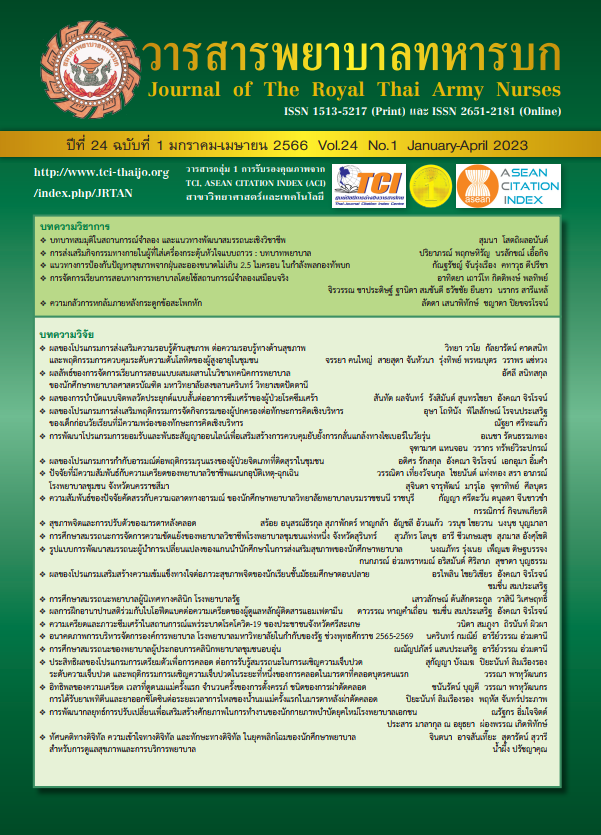The Development of Mindfulness-Based Nursing Program for Major Depressive Disorder
Keywords:
Mindfulness-Based Nursing Program, Major Depressive DisorderAbstract
The present study was to develop a Mindfulness-Based nursing program for Major depressive disorder in Srithanya Hospital during 1st March 2022 to 31st May 2022. The collecting data tools were personal data, Ruminations scale and Executive functions. The data retrieved were statistical analyzed including descriptive and Wilcoxon signed rank test. A Mindfulness-Based nursing program for Major depressive disorder consists of 6 activities, performed 3 times per week, every other day for 2 consecutive weeks, and 40-50 minutes period of each activity. The result revealed that the experimental group (n=12) had a lower difference in mean ruminations and executive functions than before with statistical significance (p < .05). It can be concluded the Mindfulness-based nursing program for Major depressive disorder can reduce rumination and improving the executive functions effectively. It is the guideline for the appropriate treatment of rumination and executive functions for Major depressive disorder.
Downloads
References
World Health Organization. Depression and Other Common Mental Disorders: Global Health Estimates. Geneva: World Health Organization; 2017.
Kamenov K, Twomey C, Cabello M, Prina A, & Ayuso-Mateos J. The efficacy of psychotherapy, pharmacotherapy and their combination on functioning and quality of life in depression: a meta-analysis. Psychological medicine 2017; 47(3): 414-25.
Schwert C, Aschenbrenner S, Weisbrod M, & Schröder A. Cognitive impairments in unipolar depression: the impact of rumination. Psychopathology 2017; 50(5): 347-54.
Vilamart K, Haenjohn J, & Sirithadakunlaphat S. Development of Program for Promoting Executive Functions of the Brain by NeuroLinguistic Programming for Secondary School Students with Internet Addiction. Journal of Royal Army Nurses 2021; 22(3): 237-46. (in Thai)
du Pont A, Rhee S, Corley P, Hewitt K, & Friedman P. Rumination and executive functions: Understanding cognitive vulnerability for psychopathology. Journal of Affective Disorders 2019; 256: 550-9.
Pan Z, Park C, Brietzke E, Zuckerman H, Rong C, Mansur R, & McIntyre R. Cognitive impairment in major depressive disorder. CNS spectrums 2019; 24(1): 22-9.
Pu S, Setoyama S, & Noda T. Association between cognitive deficits and suicidal ideation in patients with major depressive disorder. Scientific reports 2017; 7(1): 1-6.
Pliankerd P. Depressive disorder: Nurse’s role in nursing care. Journal of Royal Army Nurses. 2021; 15(1): 18-21. (in Thai)
Segal V, Williams M, & Teasdale J. Mindfulnessbased cognitive therapy for depression. Second Edition. New York: Guilford Publications; 2018.
Wongphiromsant Y. Manual of Mindfulness base counseling. Bangkok: Beyond Publishing; 2020. (in Thai)
Wongsakorn P, Bunthumporn N, & Soonthornchaiya R. The Effects of A Mindfulness Based Practice on Stress Among Inmates. Journal of Royal Army Nurses. 2018; 15(1): 269-78. (in Thai)
Cladder-Micus M, Becker E, Spijker J, Speckens A, & Vrijsen J. Effects of mindfulness- based cognitive therapy on a behavioural measure of rumination in patients with chronic, treatment-resistant depression. Cognitive Therapy and Research 2019; 43(4): 666-78.
Amiri M, Rabiei M, & Donyavi V. Effectiveness of mindfulness training in enhancing executivefunction and decreasing symptoms of depression and anxiety in patients with multiple sclerosis (MS). Journal of behavioral and brain science 2016; 6(8): 329-36.
Cladder-Micus B, Becker S, Spijker J, Speckens A, & Vrijsen N. Effects of mindfulness-based cognitive therapy on a behavioural measure of rumination in patients with chronic, treatment-resistant depression. Cognitive Therapy and Research 2019; 43(4): 666-78.
Lam K, & Seiden D. Effects of a brief mindfulness curriculum on self-reported executive functioning and emotion regulation in hongkong adolescents. Mindfulness 2020; 11(3): 627-42.
Puapan S. Caring for Suffering Patients with Human Minds: Application of Theory Watson’s Human Care Part 1. Nursing Science Journal Christian University 2015; 2(2): 139-50. (in Thai)
Thanoi W, Panitrat R, Phancharoenworakul K, Thompson E, & Nityasuddhi D. The Adolescent Ruminative Response Scale (Thai version): Psychometric Properties. Nursing Science Journal of Thailand. 2011; 29(3): 19-38.
Fox C, Mueller S, & Gray H, RaberJ,Piper B. Evaluation of a short-form of the Berg Card Sorting Test. PloS one 2013; 8(5): e63885.
Pattananonkiat Y, Kunkhamchoo P, Ruchirachakon S & Saetang S. A Guide to Researchand Development of Mental Health Technology. Nonthaburi: Best Step Advertising; 2011. (inThai)
Cocks, K., & Torgerson D. Sample size calculations for pilot randomized trials: a confidence interval approach. Journal of clinical epidemiology 2013 66(2), 197-201.
Downloads
Published
How to Cite
Issue
Section
License
Copyright (c) 2023 Journal of The Royal Thai Army Nurses

This work is licensed under a Creative Commons Attribution-NonCommercial-NoDerivatives 4.0 International License.
บทความหรือข้อคิดเห็นใดใดที่ปรากฏในวารสารพยาบาลทหารบกเป็นวรรณกรรมของผู้เขียน ซึ่งบรรณาธิการหรือสมาคมพยาบาลทหารบก ไม่จำเป็นต้องเห็นด้วย
บทความที่ได้รับการตีพิมพ์เป็นลิขสิทธิ์ของวารสารพยาบาลทหารบก
The ideas and opinions expressed in the Journal of The Royal Thai Army Nurses are those of the authors and not necessarily those
of the editor or Royal Thai Army Nurses Association.






